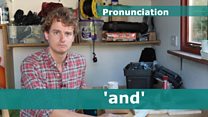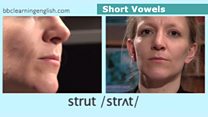Unit 11: Towards Advanced
Grammar, news, vocabulary and pronunciation
Select a unit
- 1 Towards advanced
- 2 Towards advanced
- 3 Towards advanced
- 4 Towards advanced
- 5 Towards advanced
- 6 Towards advanced
- 7 Towards advanced
- 8 Towards advanced
- 9 Towards Advanced
- 10 Towards Advanced
- 11 Towards Advanced
- 12 Towards Advanced
- 13 Towards Advanced
- 14 Towards Advanced
- 15 Towards Advanced
- 16 Towards Advanced
- 17 Towards Advanced
- 18 Towards Advanced
- 19 Towards Advanced
- 20 Towards Advanced
- 21 Towards Advanced
- 22 Towards Advanced
- 23 Towards Advanced
- 24 Towards Advanced
- 25 Towards Advanced
- 26 Towards Advanced
- 27 Towards Advanced
- 28 Towards Advanced
- 29 Towards Advanced
- 30 Towards Advanced
Session 5
Tim's Pronunciation Workshop: 'have to'
How do fluent speakers pronounce 'have to' when it's a modal verb of obligation? Tim explains...
Activity 1
Tim's Pronunciation Workshop: 'Have to'
The early bird catches the worm...
Tim's back in his pronunciation workshop. This time he's finding out how English speakers pronounce 'have to' - and he's also finding out what time Londoners get up in the mornings...
To do
Take a look at the video, then try the activity to do some practice.
Watch the video and complete the activity

Tim
Hi. I'm Tim and this is my Pronunciation workshop. Here I'm going to show you how English is really spoken. It'll help you to become a better listener and a more fluent speaker. Are you ready? Come on, follow me.
Now, are you an early bird? Do you catch the worm? Do you even have the faintest idea what I’m talking about? Well, in English, an early bird is someone who gets up early in the morning. Now I hate waking up early, but because of my job sometimes I have to get up before 11 o'clock in the morning. I know - that's terrible, but I do it, just for you. Let’s find out about some other Londoners.
Voxpops
I have to get up in the morning at six a.m.
I have to get up at half past six every morning.
I have to get up in the morning at 6.45.
I have to get up at 8 o'clock.
I have to get up at 5 or 6 o'clock.
Tim
The word ‘have’ ends in the sound /v/, doesn’t it - or does it? Listen again: what sound can you actually hear? Also, pay attention to the pronunciation of the word ‘to’.
Voxpops
I have to get up in the morning at six a.m.
I have to get up at half past six every morning.
I have to get up in the morning at 6.45.
I have to get up at 8 o'clock.
I have to get up at 5 or 6 o'clock.
Tim
When we use the verb ‘have’ in its modal form: ‘have to’ meaning an obligation, the /v/ at the end of the word changes to an /f/. Also the vowel sound in the word ‘to’ changes to a schwa - /ə/. ‘Have to’ becomes /hæftə/. Here are some more examples.
Examples
They have to be there by 10.
We have to find another flat.
You have to tell me the gossip.
I always have to take the train.
Tim
Right, so you’ve heard the examples, and now it’s your turn. Are you ready to start? Listen and repeat.
Examples
They have to be there by 10.
We have to find another flat.
You have to tell me the gossip.
I always have to take the train.
Tim
Well done. Now remember, if you want to learn more about pronunciation, then please visit our website, bbclearningenglish dot com. And that is about it from the workshop for this week: I'll see you soon. Bye bye. Right, now as I got up at the crack of 11.00 in the morning, I’m exhausted – I have to grab 40 winks before the next shoot. Night night. Ah, that's good...
To do
Got that? Now try this activity to get some more practice.
The /hæftə/ game
5 Questions
How many examples of 'have to' pronounced /hæftə/ are there in each sentence? You decide...
Help
Activity
How many examples of 'have to' pronounced /hæftə/ are there in each sentence? You decide...
Hint
When English speakers say the phrase ‘have to’, the /v/ sound often changes to an /f/, and the word ‘to’ is pronounced with schwa - /ə/. So ‘have to’ is pronounced /hæftə/.Question 1 of 5

Help
Activity
How many examples of 'have to' pronounced /hæftə/ are there in each sentence? You decide...
Hint
When English speakers say the phrase ‘have to’, the /v/ sound often changes to an /f/, and the word ‘to’ is pronounced with schwa - /ə/. So ‘have to’ is pronounced /hæftə/.Question 2 of 5

Help
Activity
How many examples of 'have to' pronounced /hæftə/ are there in each sentence? You decide...
Hint
When English speakers say the phrase ‘have to’, the /v/ sound often changes to an /f/, and the word ‘to’ is pronounced with schwa - /ə/. So ‘have to’ is pronounced /hæftə/.Question 3 of 5

Help
Activity
How many examples of 'have to' pronounced /hæftə/ are there in each sentence? You decide...
Hint
When English speakers say the phrase ‘have to’, the /v/ sound often changes to an /f/, and the word ‘to’ is pronounced with schwa - /ə/. So ‘have to’ is pronounced /hæftə/.Question 4 of 5

Help
Activity
How many examples of 'have to' pronounced /hæftə/ are there in each sentence? You decide...
Hint
When English speakers say the phrase ‘have to’, the /v/ sound often changes to an /f/, and the word ‘to’ is pronounced with schwa - /ə/. So ‘have to’ is pronounced /hæftə/.Question 5 of 5

Excellent! Great job! Bad luck! You scored:
End of Unit 11
We hope that was useful. In Unit 12, Sian has a Masterclass on adding emphasis. In News Review and LingoHack you can find out which words are making the headlines - and Tim will be back with the pronunciation workshop as usual. See you there!
Session Vocabulary
Pronunciation of 'have to'
When English speakers say the phrase ‘have to’, the /v/ sound often changes to an /f/, and the word ‘to’ is pronounced with schwa - /ə/. So ‘have to’ is pronounced /haeftə/.Examples of where this might happen include:
- They have to be there by 10.
- You have to tell me the gossip.
- I always have to take the train.


